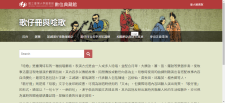|
|
| Resource name | National Taiwan University -Kua-á tsheh Digial Archives |
|---|---|
| URL | https://dl.lib.ntu.edu.tw/s/kua-a-tsheh |
| Attached picture |  |
| Language | Chinese |
| Introduction | The library's collection of Kua-á tsheh is mostly drawn from the collections of Professor Yun-ping Yang. A smaller part is taken from collections donated by Shui-di Yan, an intellectual from Chang-hua. Professor Yang is known both as a poet and a historian, but he was also an active collector of historical artworks and other documents. His collections include more than six hundred Kua-á tsheh, published in both Taiwan and China. The collection is remarkable for its variety and for the early publication of many of its items, which are more than half a century old. Due to Taiwan's unique background and its uncertain political status, fine arts and culture on the island has been somewhat hard to preserve. However, Taiwan's multi-ethnic cultural heritage has produced a vibrant popular culture, and these Kua-á tsheh are excellent examples. Known for its expressiveness, Taiwanese ballad is ideal for sociological study due to its concern with all levels of society. The style of the lyrics can be roughly divided into didactic and realistic. The didactic type includes songs that offer advice, as well as those that preach in an ironic tone. Realistic songs include folktales, historical narratives, romantic duets, comical stories, and songs that reflect a changing world. These Kua-á tsheh are written in Chinese for Taiwanese pronunciation. However, due to discrepancies between different Taiwanese dialects, some of the songs are written using classical Chinese while others adopt Chinese characters only for their phonetic value. This fact makes the lyrics difficult to understand on some occasions. Since the library's collection of Kua-á tsheh contains a great number of early copies, their condition does not allow them to be frequently consulted. The digitization project will tackle this problem by constructing a database with the collection's images, full-texts, and metadata records. It is expected that the complete archiving of the collection will not only add more variety to the NTU Library digital database but also inspire more research in the field. |
| Cooperation | National Taiwan University |
Total Visitors:5920563
Last Updated:2024.04.24 |
 |


